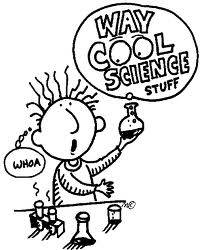
We scientists are good at lots of things: designing controlled studies, gathering data, analyzing those data using statistics, writing scientific papers, public speaking, teaching students. But one aspect of this job of being scientists is so very new (and sometimes uncomfortable) to us that we have made little or no effort to train junior scientists to do it. And that is communicating science beyond the scientific writing we do for other scientists. We scientists must contend with the stereotype that we are bad communicators. I don’t actually think it’s true, but the media isn’t doing us any favors in this regard. Just listen to anthropologist Temperance Brennan on Fox’s Bones sometime. At least Uma Thurman’s botanist Poison Ivy had those groovy leafy eyebrows, though she was evil, and the eyebrows couldn’t save a terrible movie (that sound you hear from 1997 is a “sigh” from a deflated high school me). Some amazing scientists have a knack for being engaging and have made broad cultural impacts: Carl Sagan, Stephen Jay Gould, Richard Dawkins, Illinois’ own May Berenbaum, just to scratch the surface.
 But outside the brave few that write popular articles or books and give public lectures, we scientists haven’t made a concerted effort to improve our rapport with non-scientists. We mostly spend our time communicating with other scientists within our increasingly-narrow sub-fields. Recently this “ivory tower” mentality has come back to bite us. Public misunderstanding and mistrust of science has been pretty discouraging lately. Back in 2008, when Sarah Palin made her infamous remarks disparaging funding for fruit fly research, geneticists everywhere were grimacing. How had we failed in our mission, so much so that a governor could be so ignorant of the great advances that we have gained from this tiny insect, as well as other, seemingly-humble species? No, she didn’t need to be able to list the great advances. But is a general understanding of how scientific research works too much to ask? Understanding enough to even be able to imagine how the fruit fly could have taught us so much about the DNA of all life on earth? What about climate science? Evolutionary biology? Important decisions at the national and even global level rely on a level of scientific understanding. Do we need to cap CO2 emissions? What should we teach our kids about human biology? No, it’s not about the details. It’s not about the facts. It’s the process that matters. How do scientists do science? Why do we believe some forms of evidence more than others? How is science, as a way of knowing, fundamentally different from other ways to explore and learn about the world?
But outside the brave few that write popular articles or books and give public lectures, we scientists haven’t made a concerted effort to improve our rapport with non-scientists. We mostly spend our time communicating with other scientists within our increasingly-narrow sub-fields. Recently this “ivory tower” mentality has come back to bite us. Public misunderstanding and mistrust of science has been pretty discouraging lately. Back in 2008, when Sarah Palin made her infamous remarks disparaging funding for fruit fly research, geneticists everywhere were grimacing. How had we failed in our mission, so much so that a governor could be so ignorant of the great advances that we have gained from this tiny insect, as well as other, seemingly-humble species? No, she didn’t need to be able to list the great advances. But is a general understanding of how scientific research works too much to ask? Understanding enough to even be able to imagine how the fruit fly could have taught us so much about the DNA of all life on earth? What about climate science? Evolutionary biology? Important decisions at the national and even global level rely on a level of scientific understanding. Do we need to cap CO2 emissions? What should we teach our kids about human biology? No, it’s not about the details. It’s not about the facts. It’s the process that matters. How do scientists do science? Why do we believe some forms of evidence more than others? How is science, as a way of knowing, fundamentally different from other ways to explore and learn about the world?
With this context in mind, here we are, conducting a “sorta experiment” on how we can try to actually do something (communicate, make an impact) while training ourselves and our graduate students to do as much. Earning a Ph.D. in science means doing all the hard work it takes to transition from being a student of science (one who reads the discoveries of scientists) to being a scientist (one who makes and broadcasts one’s own discoveries). But scientists don’t just do research. We teach, and increasingly we communicate. We’re pretty darned good at training researchers. We’re less good at training skilled teachers (though graduate training is quickly improving). And we have hardly even tried to train communicators. And this is really too bad, given the sorry state of popular discourse on science in America. Making a so-called “broader impact,” in some fashion, is an increasingly important aspect of acquiring research funding from agencies like the National Science Foundation.
 However, this outreach thing is one aspect of my newish job as a faculty member for which I felt completely unprepared. Thus, here we present articles that graduate students in Integrative Biology have written as part of a course on science communication and outreach. It’s the next frontier in graduate training. So forgive us, but you are our guinea pigs, our lab rats. We’re imposing treatments on you. We’re trying out our new material. Throughout the month of November, the class of Integrative Biology will present articles that they have written as part of a course on science communication and outreach. We’ve been working with Smile Politely, and it has been great. Hopefully we can keep this thing going.
However, this outreach thing is one aspect of my newish job as a faculty member for which I felt completely unprepared. Thus, here we present articles that graduate students in Integrative Biology have written as part of a course on science communication and outreach. It’s the next frontier in graduate training. So forgive us, but you are our guinea pigs, our lab rats. We’re imposing treatments on you. We’re trying out our new material. Throughout the month of November, the class of Integrative Biology will present articles that they have written as part of a course on science communication and outreach. We’ve been working with Smile Politely, and it has been great. Hopefully we can keep this thing going.
Geek out, everybody.
Katy Heath, Assistant Professor of Plant Biology
Elizabeth Bagley, College of Education Postdoctoral Fellow and currently a Learning Designer at LeapFrog
~~*~~
Smile Politely is proud to introduce a new running series we are calling “Science Politely” that will feature the work of graduate students at the University of Illinois. Working in collaboration with the students in a graduate course in Integrative Biology, Science Politely is a collaboration aimed at bridging the gap between town and university, between scientist and citizen, and between research and culture.








